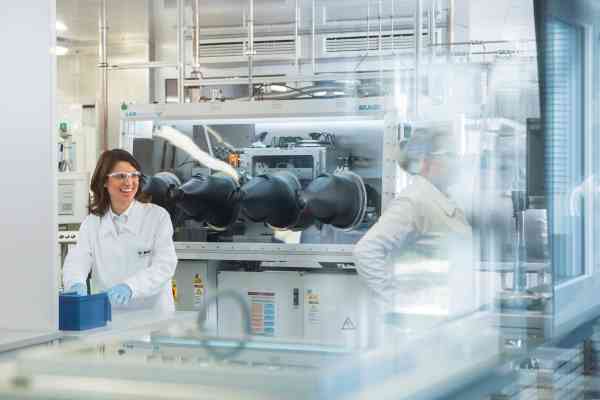August 5th, 2022 | 11:54 CEST
Meta Materials, JinkoSolar, BioNTech - Smart technologies as growth boosters
Solar and photovoltaic companies have been hot in the financial markets since the shifts in the energy market. Chinese supplier JinkoSolar, for example, is now launching solar batteries for home use. Smart buildings are an important component in urban city planning. Where there is plenty of sunshine, its energy is converted for personal use, and Australian residents are benefiting from JinkoSolar's technology. In order to increase the efficiency of such energy sources, Meta Materials offers innovative solutions that make solar systems even more cost-effective. Thanks to numerous patents, they also have a business model, which will please long-term investors in terms of growth opportunities. Rather unpleasant, however, are the measures planned by the German government for the coming fall and winter. Masks or vaccination is the calculation, which will at least bring some joy to BioNTech shareholders.
time to read: 5 minutes
|
Author:
Juliane Zielonka
ISIN:
Meta Materials Inc. | US59134N1046 , JINKOSOLAR ADR/4 DL-00002 | US47759T1007 , BIONTECH SE SPON. ADRS 1 | US09075V1026
Table of contents:

"[...] As a company dedicated to developing treatments for rare heart diseases, we see this as an opportune moment to contribute to the fight against heart disease and make meaningful strides in improving heart health worldwide. [...]" David Elsley, CEO, Cardiol Therapeutics Inc.
Author
Juliane Zielonka
Born in Bielefeld, she studied German, English and psychology. The emergence of the Internet in the early '90s led her from university to training in graphic design and marketing communications. After years of agency work in corporate branding, she switched to publishing and learned her editorial craft at Hubert Burda Media.
Tag cloud
Shares cloud
Meta Materials - The future of energy supply in urban areas
What energy supply will look like in cities of the future is being researched by students at TU Delft. In the master's program, aspiring architects learn how urban spaces influence climate and energy supply through intelligent facades. Past urban planning has turned city centers into concrete jungles. But commercially used buildings offer a real treasure trove of possibilities as smart buildings.
Smart buildings are buildings equipped with intelligent building technology and building automation. By linking the individual components in a network, they can communicate with each other and exchange data. That makes the building "smart" and enables it to respond flexibly to the needs of its users. In this way, entire facades can be covered with solar layers in the future to secure energy supplies.
The company Meta Materials is fully committed to this innovative field. Meta comes from Greek and means "to be one step further, to go beyond." Metamaterials are a new class of functional materials that, due to their unique structure, can interact with light and other forms of energy, which do not exist like this in nature. These materials are effectively one evolutionary step further. Meta Materials positions itself as a platform technology provider, serving industry partners in the clean energy, automotive, telecommunications and medical sectors.
The Canadian company is in the early stages of developing new solar films that will significantly increase solar cell efficiency. By collecting and absorbing light from all angles, Meta Materials' technology will be able to maximize the absorption of sunlight in solar cells - all without concentrators or tracking systems. This new technology will increase the overall performance of solar cells, reducing the cost of each kilowatt of energy generated. The application of this technology goes beyond the cleantech industry and offers high growth potential. Meta Materials is continuously securing additional patents in this area, which they then license for use.
JinkoSolar - Solar storage for home use introduced
Existing buildings can also become smart buildings. In order to create a smart building, occupants and appliances are networked together. It involves using an intelligent platform with centralized control. This system meaningfully modernizes heating and lighting systems and fire alarm devices and extends the technical life of the building.
The Chinese solar cell company JinkoSolar is taking the step of intelligent networking. JinkoSolar is bringing innovation to Australia with its new SunTank battery system. The modular system is specifically designed for residential use and consists of a lithium iron phosphate storage solution. The combination with a solar panel system makes the battery system perfect for everyday use. APAC Country Manager Thomas Bywater explains that the SunTank system is an efficient solution for owners who want to implement effective energy management in their homes. By using the system, one can reduce costs, manage demand and maximize self-consumption of electricity generation. "As one of the most mature photovoltaic markets in the world, we believe that energy storage will be an indispensable part of the Australian market," he points out.
Solar panel manufacturers will undoubtedly become more important in the coming years as rich industrialized nations build more and more solar installations to reduce their greenhouse gas emissions. This race has gained new momentum this year following Russia's invasion of Ukraine, which has pushed the West even harder to switch to renewables and move away from Russian oil.
BioNTech - Germany's unique way to vaccination booster goes through the mask
Federal Minister of Health Karl Lauterbach has managed to provide citizens in Germany with numerous vaccinations by passing the adapted Infection Protection Act. Thus, a constantly refreshed vaccination less than three months old guarantees a mask-free restaurant visit in the fall of 2022. A return to normality, as is the case in neighbouring country France, seems impossible under the current federal government.
Imagine this in Germany: it is October 2022, and you are freshly vaccinated with a BioNTech vaccine, which cannot do much against the current virus variant. But now, you are allowed to enter the restaurant without a mask. Your date did not participate in the booster shot and must enter the restaurant with a mask. At the table, everyone takes off their mask. If you go to the restroom, you may do so without a mask. Your companion, however, must wear the medical mouth and nose protection. The current Infection Protection Act does not contain any scientific explanation for this. Come what may, the vaccines purchased for EUR 830 million by Mr. Lauterbach must go to the people. The measures adopted by law have little to do with science. The companies BioNTech and Pfizer can only be pleased with such politically imposed arbitrariness. So far, the best deals have been made with governments. The USA bought 105 million doses of the Pfizer BioNTech vaccine, which are to be supplied up to the fourth quarter of this year.
Novavax has only been on the market since late last year and is already projecting revenues of USD 4 billion to USD 5 billion this year. BioNTech and its partner Pfizer predict sales of USD 32 billion over the same period. Moderna forecasts revenues of USD 21 billion in 2022. So, quite seasonally, we can expect a surge in vaccine stock prices starting in the fall, in addition to a new wave of Corona.
The run on alternative energies and smart solutions is moving the financial markets. Meta Materials, a platform technology provider for smart surfaces, offers investors a forward-looking business model in key industries such as solar, medicine, automotive and telecommunications. Smart buildings in urban areas already offer residents in Australia the opportunity to store solar energy locally. Thanks to JinkoSolar, this innovative technology is already available to households. When it comes to the perennial pandemic, BioNTech and partner Pfizer are ahead of the game. Business with governments worldwide is good, and Germany, in particular, can look forward to a booster every three months if it follows the rules of the Federal Ministry of Health.
Conflict of interest
Pursuant to §85 of the German Securities Trading Act (WpHG), we point out that Apaton Finance GmbH as well as partners, authors or employees of Apaton Finance GmbH (hereinafter referred to as "Relevant Persons") may hold shares or other financial instruments of the aforementioned companies in the future or may bet on rising or falling prices and thus a conflict of interest may arise in the future. The Relevant Persons reserve the right to buy or sell shares or other financial instruments of the Company at any time (hereinafter each a "Transaction"). Transactions may, under certain circumstances, influence the respective price of the shares or other financial instruments of the Company.
In addition, Apaton Finance GmbH is active in the context of the preparation and publication of the reporting in paid contractual relationships.
For this reason, there is a concrete conflict of interest.
The above information on existing conflicts of interest applies to all types and forms of publication used by Apaton Finance GmbH for publications on companies.
Risk notice
Apaton Finance GmbH offers editors, agencies and companies the opportunity to publish commentaries, interviews, summaries, news and the like on news.financial. These contents are exclusively for the information of the readers and do not represent any call to action or recommendations, neither explicitly nor implicitly they are to be understood as an assurance of possible price developments. The contents do not replace individual expert investment advice and do not constitute an offer to sell the discussed share(s) or other financial instruments, nor an invitation to buy or sell such.
The content is expressly not a financial analysis, but a journalistic or advertising text. Readers or users who make investment decisions or carry out transactions on the basis of the information provided here do so entirely at their own risk. No contractual relationship is established between Apaton Finance GmbH and its readers or the users of its offers, as our information only refers to the company and not to the investment decision of the reader or user.
The acquisition of financial instruments involves high risks, which can lead to the total loss of the invested capital. The information published by Apaton Finance GmbH and its authors is based on careful research. Nevertheless, no liability is assumed for financial losses or a content-related guarantee for the topicality, correctness, appropriateness and completeness of the content provided here. Please also note our Terms of use.




